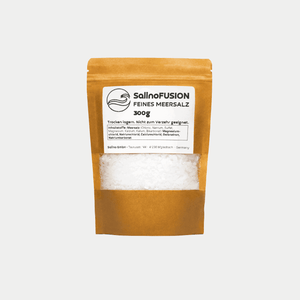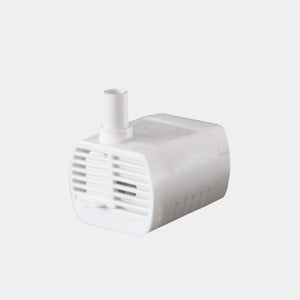The salty whisper of the waves, the endless horizon, the clear air—why do we feel so different by the sea? The answer lies deeper than just the relaxation from everyday life. Salt air has a proven effect on our psyche and can become a valuable building block for mental health.
It's that one breath that changes everything. Anyone who has ever taken their first steps by the sea after a long journey knows this moment: The salty air flows into your lungs, and suddenly something in your chest seems to expand. Not just physically—but also mentally. As if your soul can breathe properly for the first time in weeks.
What was long dismissed as romantic idealization is now increasingly being scientifically validated. Salt air affects not only our respiratory system, but also our emotional well-being in complex ways. Sea air contains tiny salt particles that, when inhaled, trigger various processes in our body—processes that go far beyond simply cleansing the respiratory tract and directly affect our nervous system.
The invisible power of aerosols
 When salt particles become healers
When salt particles become healers
Salt air is far more than just salt-enriched air. It consists of a complex mixture of aerosols – microscopic particles that are created when waves break and float in the atmosphere for hours. These natural aerosols contain not only sodium chloride, but also magnesium, potassium, and other minerals that, when inhaled, trigger a cascade of reactions in our bodies.
The size of these particles is particularly remarkable: They are so fine that they can penetrate into the deepest regions of the lungs. Once there, they influence not only the local inflammatory response but also the production of various neurotransmitters. These neurotransmitters, in turn, have a direct impact on our nervous system and thus on our mood.
The biochemistry of marine breathing
What happens in the alveoli when salt particles reach them resembles a finely orchestrated biochemical ballet. The salt ions interact with the mucous membranes and can influence the release of serotonin—the neurotransmitter often referred to as the "happy hormone." At the same time, the production of stress hormones like cortisol is dampened.
This effect isn't just noticeable in the short term. People who regularly breathe salty sea air often experience lasting changes in their stress levels and emotional balance. The salt air acts as a natural regulator for the autonomic nervous system—it can have both a calming and invigorating effect, depending on what the body needs at the time.
The rhythm of the waves as spiritual medicine
 Natural frequencies for inner peace
Natural frequencies for inner peace
The sound of the ocean isn't just noise—it's one of the most perfect natural soundscapes for mental relaxation. The steady, repetitive sounds of the waves create what acousticians call "white noise": a sound that masks other distracting sounds while simultaneously putting the brain into a meditative state.
As we breathe in salt air and listen to the rhythm of the waves, our heartbeat often synchronizes with these natural frequencies. This synchronization activates the parasympathetic nervous system—the part of the nervous system responsible for regeneration and relaxation. The constant fight-or-flight mode in which many people live today is interrupted.
The magic of the wide horizon
But the psychic effects of salt air don't unfold in a vacuum. It's inextricably linked to the visual experience of the sea. The vast horizon, the endless expanse of water, the constantly changing play of light and shadow – all of this contributes to the therapeutic effect. When we gaze into the distance, not only do our eye muscles relax. Our thoughts also have space to organize and calm down.
This combination of salt air and visual expanse creates a state psychologists call "soft fascination": a kind of relaxed attention that allows the brain to regenerate without overtaxing it. In this state, entrenched thought patterns can be released and new perspectives can emerge.
Salt air as an antidote to modern stress
 When the city dust falls from your lungs
When the city dust falls from your lungs
In our modern world, we are exposed to a multitude of air pollutants every day. Particulate matter, exhaust fumes, chemical fumes – all of these not only impact our respiratory system, but also our mental well-being. Chronic inflammatory reactions in the respiratory tract can lead to increased production of stress hormones, thus indirectly affecting our mental health.
Salt air acts like a natural purifier here. The hygroscopic properties of the salt particles – their ability to bind moisture – help release and remove pollutants from the respiratory tract. This physical cleansing process is often accompanied by a feeling of mental clarity. It's not for nothing that many people describe the first few days at the seaside as "detoxification" – even though they usually mean more than just physical cleansing.
The silence between thoughts
But salt air doesn't just provide mental relief through its chemical properties. It's also part of an environment that offers natural breaks from the mental noise of everyday life. By the sea, while deeply inhaling the salty air, many people find a form of mindfulness that is difficult to achieve in urban environments.
These moments of silence between thoughts are essential for mental regeneration. They allow the brain to organize itself, reduce stress, and gather new energy. The salt air supports this process on a biochemical level, while the marine environment creates the ideal external framework.
The healing power of salt in different phases of life
When the soul is storming
The stabilizing effect of salt air is particularly evident in times of crisis. People suffering from depression, anxiety, or chronic stress often report noticeable relief when spending time by the sea. This is not only due to the change of scenery, but also has neurobiological foundations.
Experts suspect that the negative ions contained in salt air—oxygen molecules with an extra electron—could possibly influence serotonin concentrations in the brain. There is also discussion about whether the production of cortisol, an important stress hormone, could also be reduced. This potential combination of factors suggests that sea air might have a naturally supportive effect on well-being.
The salty elixir for the tired mind
Salt air also has remarkable benefits for states of exhaustion and burnout. The combination of clean, mineral-rich air and the relaxing marine environment can help calm the overstimulated nervous system. Many people report that after a few days at the seaside, they return to a natural sleep-wake rhythm and feel more rested overall.
The minerals in salt air can also help regulate electrolyte balance, which in turn supports nervous system function. Magnesium, for example, found in natural salt air, relaxes muscles and can help with sleep problems.
Salt air in everyday life: Ways to get healing air
 Artificial seas and salty caves
Artificial seas and salty caves
Not everyone is privileged enough to live or travel by the sea regularly. However, the discovery of the healing effects of salt air has led to the development of various therapies that make these effects accessible even far from the coast.
Salt caves and salt chambers mimic the conditions of natural sea air. In these controlled environments, finely atomized salt is released into the air, creating concentrations of salt aerosols similar to those found at the seaside. Many people use these facilities to support their mental health and report similar relaxing effects to those experienced by a stay at the seaside.
Small salt moments for a big impact
Salty moments can also be created in your everyday life. Saline inhalers, originally developed for the treatment of respiratory illnesses, can also contribute to mental relaxation. Consciously inhaling salty air, combined with short relaxation exercises, can help reduce stress and increase well-being.
Regularity is key. Just like with other forms of health care, the positive effects of salt air are best achieved with consistent use. Even a few minutes a day can make a noticeable difference.
The salty future of mental health
Research into the effects of salt air on mental health is still in its early stages, but the findings so far are promising. At a time when mental health problems are on the rise and natural healing methods are receiving renewed attention, the targeted use of salt air could play an important role.
This isn't about considering salt air a panacea or a replacement for professional care. Rather, it demonstrates a way in which natural healing powers can be meaningfully integrated into a holistic health concept. The salty sea air reminds us that healing often lies in the simplest things – in conscious breathing, in pausing, in trusting in our body's regenerative power.
For those who want to enjoy the healing effects of salt air even away from the coast, there are various options available today. Salt inhalers, for example, can be a practical addition to everyday life and help you regularly experience the relaxing effects of salty air. Such devices mimic the natural conditions of sea air and allow you to integrate small moments of salt air into your day – as a gentle support for mental well-being.



